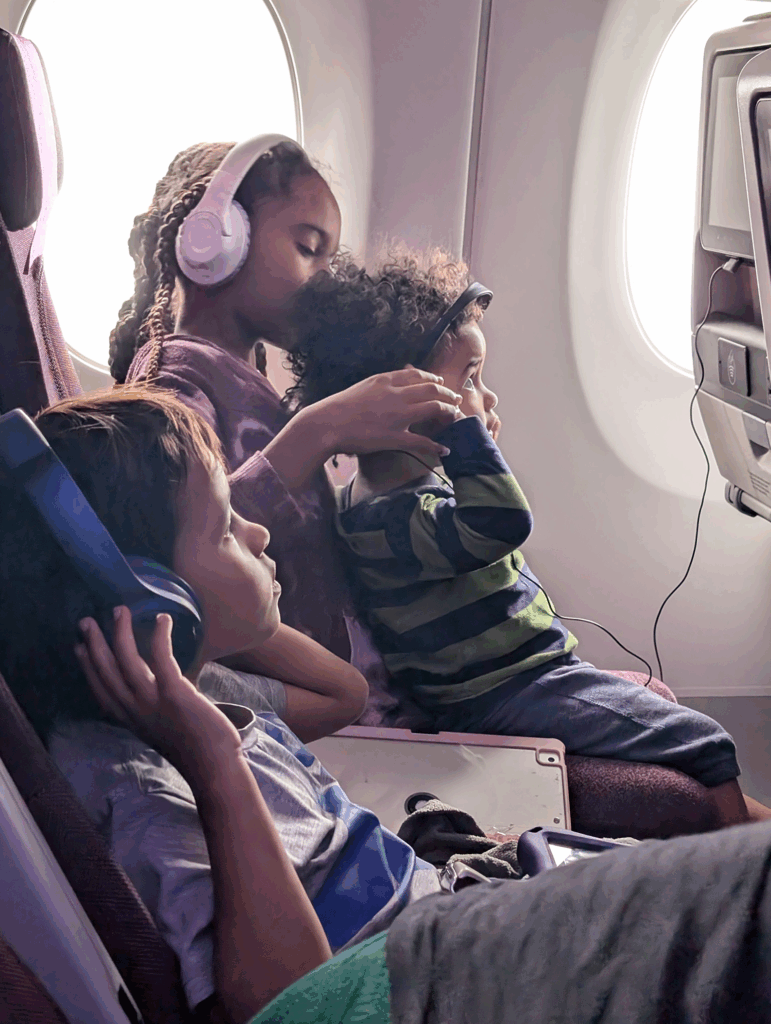The heat was sweltering, and we were exhausted. After a grueling 30-hour journey from Los Angeles, our family of five had finally arrived in Maputo, Mozambique. Just one final step—customs—stood between us and two weeks of catching up with my in-laws and watching our kids run along the beach with their cousins.
Arms weighed down with bags and sleepy kids, we reached the front of the line. That’s when we were told that our children each needed their photo taken to enter the country.
For most families, this would be a minor inconvenience. But for us, it became a significant challenge. Our seven-year-old son is autistic and non-speaking, and his sensory system can easily become overloaded. What should have been a simple photo took 45 minutes, thanks to some difficult requirements: our son had to be alone in the frame, with his eyes open, and not crying. After 30 hours in transit, he was completely dysregulated, and meeting these conditions was almost impossible—especially while trying to navigate a language barrier!
As a family with loved ones on two continents, we feel privileged to be able to take our children to visit my spouse’s side of the family. But ensuring our son’s needs are accommodated adds unique hurdles to the process.
Like many autistic children, our son experiences “demand avoidance,” a strong resistance to anything that feels compulsory. He operates on his own timing, and anything that threatens his autonomy—being rushed into the car before he’s ready, for example—can lead to a meltdown. As you can imagine, this doesn’t bode well for air travel, where the demands are relentless.
…not to mention the changes in air pressure, being confined to a small space, and the other aspects of flying that are uncomfortable for most of us, but can be unbearable for those with sensory sensitivities.

And once we land, a whole new set of challenges emerges: unfamiliar people, food, and environments. When he was four, even an unfamiliar car seat triggered a meltdown that left him shaken for days. But over the years, experience has taught us ways to ease those transitions—for him, and for us, too.
First and foremost, my biggest travel hack is regulating my own emotions, so that I can be there to support my son. To do this, I handle my own packing and planning as early as possible, removing as many potential stressors so that I’m not feeling rushed and anxious. This allows me to be a peaceful source of co-regulation for my son. Mindset shifts are also crucial. I’ve learned to manage my expectations—for example, realizing that I probably won’t get a chance to read that book I packed or enjoy an in-flight movie. I also constantly remind myself that my son isn’t trying to give me a hard time; he’s having a hard time. This helps me step out of frustration and into empathy, and helps me to show up as the mom he needs in that moment. For us, a “successful” flight isn’t about avoiding every challenge—it’s about staying calm and regulated in the midst of them.
That being said, here are some strategies that make travel easier:
After that chaotic arrival into Mozambique, we vowed to never fly again without doing our paperwork in advance. While many countries offer visas upon arrival, eliminating surprises is well worth it for families like ours.
Another essential: plenty of snacks and portable chargers for the plane. It only took one mid-flight meltdown from a dead tablet to convince us to stock up on multiple portable chargers. Plus, favorite foods and videos/games on a tablet can bring a sense of familiarity and comfort to an uncomfortable experience.
Speaking of snacks: always bring more than you think you’ll need! Our son is a little more adventurous with food these days, but as a preschooler his diet was very restricted. On our trip to Mozambique, I had packed 8 boxes of graham crackers (the one specific brand that he would eat), and that is literally all he consumed for 2 weeks straight. Even things like fruit and yogurt, which he enjoyed at home, felt too different in a new place. It wasn’t ideal, but it kept him fed!
On a recent trip to Kenya, two other choices made a huge difference for us. First, we updated our son’s AAC (Augmentative and Assistive Communication) device with pictures of his grandparents and cousins. Just before we left, I caught him scrolling through the images, tapping on their names. It helped him understand that we weren’t just visiting a place—we were visiting our beloved family, and it seemed to help him connect with them when we arrived.
We also created a “social story”: a miniature picture book we made that illustrated every step of our journey: our suitcases, the airport, the connecting flights, his grandparents’ driveway. At each leg of the journey, we flipped to the next page together. That little book saved us as our son was refusing to board our final connecting flight—it reminded him that we were just one step away from landing in Kenya, and calmed him down far more than I’d anticipated!
Finally, if you’re traveling from a U.S. airport, the TSA Cares program is phenomenal! The first time we used it, we felt like a superhero had come to our rescue. We were basically assigned our very own TSA agent to take us through the security line start to finish, and her kind and understanding energy rubbed off on the whole family. Any parent of a child with support needs knows that impatience, sighs, and stares from other travelers can make a hard process even worse. The agent’s presence felt like a shield from any judgement or negativity as she gently helped our son stay in line and adjust to every step of the security process.
Traveling with an autistic child requires more planning, more patience, and definitely more snacks. But it’s worth it, because our neurodivergent children deserve to experience the world! My son deserves to run barefoot through the grass in his grandparents’ lush backyard and tend to their vegetable garden. He deserves endless chapatis, sweet masala chai, and sizzling Kenyan sausages. He deserves to giggle with his cousins and snuggle with his uncles and aunties. And as we keep learning how to best meet his needs, we look forward to making more and more joyful memories.

Ellie Hunja is the author of Blessings, New Mom: A Women’s Devotional and Teen Devotional for Girls. Her writing on faith, social justice, mental health, neurodiversity, and more has been featured on Her View from Home, Thought Catalog, The Mighty, and in print in TheMomCo Magazine and the book So God Made a Mother. An alum of Georgetown University and the University of Michigan, she lives in Los Angeles with her husband and three children.
Website: www.elliehunja.com
Instagram: @ elliehunja
Facebook: @ EllieHunjaWriter


©2024. Made with (❤︎) in Yachayninchik